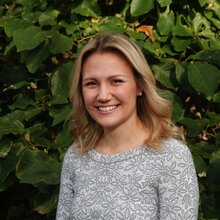Colin McCarthy is Seeking Access for All
Colin McCarthy has been a person with a disability since he was fourteen and discovered he had Ewing’s sarcoma, a rare type of cancer, predominantly diagnosed in children. To save his life, his leg was amputated at the hip. Since then, he has been working to make the world as accessible as possible for all.
“If I wasn’t trying to break down barriers, I wouldn’t be able to leave the house,” Colin said.
Colin has been an accessibility consultant since 2009 when he founded his company, Canadian Accessibility Consultants. Using his experience of owning a small business and, later, designing corporate development programs for a GTA College, Colin works with his team to help businesses understand the importance of developing accessible spaces and all the benefits that come from thinking about accessibility first.
Growing Business Through RHFAC Training
Colin learned about Rick Hansen Foundation Accessibility CertificationTM (RHFAC) Training from a radio ad in Toronto. After repeatedly being asked about the course by his clients, he decided to investigate further, ultimately enrolling in the course through George Brown College in Toronto.
“I realized that the program has so much depth and while it’s something I’ve been doing, it’s an incredible course that should be thought about not only across the country, but the world,” he explained.
RHFAC Training teaches individuals how to use the RHFAC methodology to rate buildings on their level of meaningful access and identifies areas for possible improvement. Upon successful completion and passing the subsequent RHFAC Professional exam, individuals will obtain their RHFAC Professional designation, qualifying them to conduct RHFAC ratings for existing buildings and pre-construction plans. The training course provides an understanding of how to interpret accessibility in the built environment.
“The course brings a level of credibility to the work. It’s a name people recognize,” he said.
Colin is also a part of the RHFAC technical subcommittee which is responsible for updating and evolving the certification program. An updated RHFAC rating survey is released every three years so we can incorporate innovations in accessible design, the data we receive from the industry, and changes to best-in-class standards and research to ensure the program stays on the forefront of innovation He brings his lived experience to help develop the newest version and is helping to create spaces that are as accessible as possible for all.
Opening Up the Marketplace
Part of what drives Colin is being able to show businesses that accessibility does not cost a lot. He explained that often, small businesses fear government mandates such as Accessibility for Ontarians with Disabilities Act (AODA) or the Accessible Canada Act, because to comply they think it’s going to cost a lot of money and hurt their business – but this couldn’t be further from the truth.
“I bring life experiences as a person with a disability, and I bring experience developing programs, and I know what it’s like to work in a small business,” Colin explained. “I can show them how to use accessibility and open up a marketplace and edge out their competition.”
Not only does Colin value showing the benefits of accessibility to his clients, but he works internally to provide opportunities for people with disabilities.
“Everyone I work with [at Canadian Accessibility Consultants] has a disability. If I can help provide jobs for people with disabilities, that’s amazing and they can use their lived experience to help our clients,” he noted. “We can find solutions that people without a disability don’t think about.”





